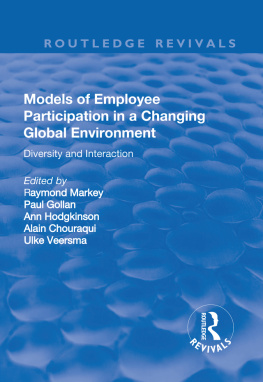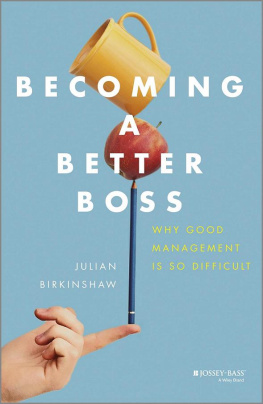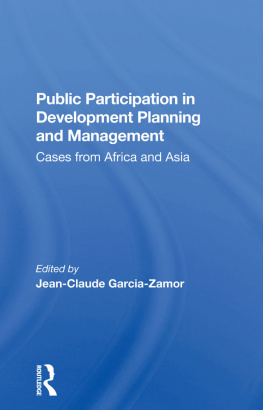Models of Employee Participation in a Changing Global Environment
Diversity and interaction
Edited by
Raymond Markey
University of Wollongong, Australia
Paul Gollan
London School of Economics
Ann Hodgkinson
University of Wollongong, Australia
Alain Chouraqui
LEST/CNRS, Aix-en-Provence, France
Ulke Veersma
Nijmegen University, Netherlands
First published 2001 by Ashgate Publishing
Reissued 2018 by Routledge
2 Park Square, Milton Park, Abingdon, Oxon, OX14 4RN
711 Third Avenue, New York, NY 10017, USA
Routledge is an imprint of the Taylor & Francis Group, an informa business
Copyright 2001 Ray Markey, Paul Gollan, Ann Hodgkinson, Alain Chouraqui, Ulke Veersma
The editors have asserted their moral right under the Copyright, Designs and Patents Act, 1988, to be identified as the editors of this work.
All rights reserved. No part of this book may be reprinted or reproduced or utilised in any form or by any electronic, mechanical, or other means, now known or hereafter invented, including photocopying and recording, or in any information storage or retrieval system, without permission in writing from the publishers.
Notice:
Product or corporate names may be trademarks or registered trademarks, and are used only for identification and explanation without intent to infringe.
Publishers Note
The publisher has gone to great lengths to ensure the quality of this reprint but points out that some imperfections in the original copies may be apparent.
Disclaimer
The publisher has made every effort to trace copyright holders and welcomes correspondence from those they have been unable to contact.
A Library of Congress record exists under LC control number: 2001091324
ISBN 13: 978-1-138-73083-0 (hbk)
ISBN 13: 978-1-315-18928-4 (ebk)
Jos Benders
Jos Benders (born 1965; MBA, 1988; PhD 1993) was a Senior Research Fellow at the Nijmegen Business School, Catholic University of Nijmegen, the Netherlands. Prior to joining the Nijmegen Business School in 1992, Jos was a PhD candidate at the Department of Business Administration of Tilburg University. In 1996-1997, he was Visiting Senior Fellow at the Department of Management of the University of Wollongong, Australia. In April and May 2001 he stayed as a Visiting Researcher at Kansai University, Osaka, Japan. His research interests include the development and application of organization concepts, the history of cellular manufacturing and medieval coinage. He has published in such journals as Information & Management, Journal of Management Studies , New Technology, Work and Employment, Organization and Work, Employment and Society and is author of Optional Options: Work Design and Manufacturing Automation (1993), co-author of Useful but Unused; Group Work in Europe (1999), and co-editor of The Symbiosis of Work and Technology (1995) and Mirroring Consensus; Decision-Making in Japanese-Dutch Business (2000).
Alain Chouraqui
Alain Chouraqui is 51 years old, with two children. He has a PhD in Legal Studies, and HDR in Political Sciences, and is nowadays Director of Research (Sociology) in the French National Centre for Scientific Research (LEST, Aix-en-Provence). He currently teaches in the Universities of Aix-en-Provence and Marseilles, and has been invited to many countries to offer courses and conference contributions. Alain also is an expert in Social and Labour Affairs at the European Commission, the OECD and the ILO. He has been a scientific coordinator in many conferences and long term research programs at French, European or international levels, notably the European program EPOC (Employee Participation in Organisational Change) covering 5800 companies in 12 European countries. Alain has authored or edited numerous works (7 books and 128 papers) on the sociology of labour, industrial relations, law and society, and on co-operation between social actors and research centres. These works have been translated into twelve languages. He was elected from 1995 as a President of the International Research Committee on 'Participation, Organisational Democracy and Self-management' of the International Sociological Association (ISA). This sister committee to the IIRA's Study group on Workers' Participation comprises about 300 members in the five continents, and organises each year three or four international conferences or seminars, leading to publications.
Edward M. Davis
Edward M. Davis is Professor of Management, Director of the Labour-Management Studies Foundation and Deputy Director (Performance) at the Macquarie Graduate School of Management. He holds a Master of Arts from Cambridge, a Master of Economics from Monash and a PhD from La Trobe University. During 1992 he held the post of Distinguished Academic Visitor at Queens' College, Cambridge. He is the author and co-editor of several books. His most recent book is Making the Link: Affirmative Action and Industrial Relations No. 11 (Sydney, CCH). It was co-edited with Professor Valerie Pratt. Professor Davis has acted as a consultant on industrial relations to employers, unions and government and he has also undertaken assignments for the International Labor Organisation. His current research explores the effectiveness of performance management in several major police services. He is National President of the Industrial Relations Society of Australia. At Macquarie University, Professor Davis is a past President of the Association of Professors. He currently chairs the University's Equal Opportunity and Probation (conversion to tenure) Committees. In 1997 he was honoured with a University award for outstanding teaching.
Michiel Drucker
Michiel Drucker (1969) is a PhD student at the Human Resource Department at the Faculty of Technology and Management of the University of Twente. He holds a Masters Degree in Political Sciences from the University of Amsterdam. His PhD thesis is about the relationship between organisational change, forms of direct participation and the position and role of the works council.
Johan Elvemo
Johan Elvemo is a Senior Research Scientist at SINTEF Industrial Management, New Praxis, in Trondheim, Norway. He holds a PhD in Organization from the Norwegian University of Science and Technology in Trondheim, His main research areas are enterprise development and globalisation.
Paul J. Gollan
Paul J. Gollan is a Lecturer in the Department of Industrial Relations at the London School of Economics. In 2000 he was also a Visiting Lecturer at the Management Centre at Kings College, London and the Management School at Imperial College. Previously he was a Lecturer in Management at the Graduate School of Management, Macquarie University, and Senior Researcher at the Australian Centre for Industrial Relations Research and Training (ACITTT, University of Sydney). He has also worked as a senior researcher at the Australian Graduate School of Management (University of NSW) Centre for Corporate Change, and lectured at the University of Surrey (UK). Paul has published Globalisation and Its Impact on the World of Work and Future of Work: Likely Long Term Developments in the Restructuring of Australian Industrial Relations, and has co-authored with J. Campling, Bargained Out: Working without Unions in Australia (Federation Press, 1999). In addition Paul has authored a forthcoming textbook Strategic Human Resource Management: A Critical Review (Pearsons Education, 2001), and will release a new book entitled Managing Workplace Relations (Sage Publications) in 2002. Paul has also written extensively for the Australian Financial Review, Sydney Morning Herald, The Australian and The Age newspapers. Paul is a Member of the International Industrial Relations Association, NSW Industrial Relations Society, British Universities Industrial Relations Association, Institute of Management (UK), and Australian Institute of Management, and an Associate Fellow of the Australian Human Resources Institute.





